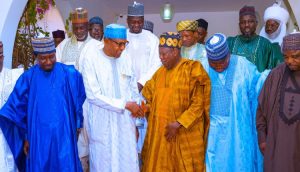▪︎ House Speaker, Gbajabiamila, frowns at Buhari, CBN actions
The defiant language and actions of governors elected on the platform of the ruling All Progressives Congress (APC) is rising in crescendo with Governor Umaru Ganduje accusing President Muhammadu Buhari and Central Bank of Nigeria (CBN) of working to destroy the APC and democracy.
Also, the Jigawa State Government, like Kaduna, says old naira notes remain legal tender in the state pending the judgment of the Supreme Court on the issue.
State Commissioner for Information, Youths Sports and Culture Bala Ibrahim Mamsa in a statement, said “Jigawa State is among the states before the Supreme Court of Nigeria the CBN and the court has issued an order “…restraining the CBN from suspending or determining or ending on the 10th of February, 2023 the time frame within which the now older versions of the 200, 500 and 1000 denominations of the naira may no longer be legal tender pending the hearing and determination of the …. Motion on notice…”
The state government admonished citizens of the state to desist from disobeying the law and causing hardships to the people of the state, warning that it would take action against anyone found rejecting old Naira notes.

The government advised the general public to report any trader or business organisations refusing the notes as legal tender to the appropriate authorities.
Late on Wednesday in Kano at a meeting with the Forum of Former Parliamentarians, North-West zone in Kano, Ganduje lamented, “Imagine someone contesting without winning elections until after a merger was formed. He won the election and spent four years and re-contested again and won. Now that he is about to go, he is doing nothing but destroy the party that elected him…
“What is wrong with doing it (Naira swap policy) after elections? Why hasn’t he (Godwin Emefiele) done this in the past seven years? What is the meaning of all these? This CBN governor is not a politician; he doesn’t know anything about politics. How can a politician enjoy this policy? Imagine how as a leader you watch banks engulfed by fire, if not that the democracy has decayed, will that be possible?
“How is it possible when the World Bank said the policy is wrong, the IMF said it is wrong, other leaders said it is wrong, but you said you need seven days to think about it? The poor man selling vegetables will have his goods rotten (before the end of the thinking period), that is why I close down one supermarket for rejecting the old notes. The Supreme Court has said the old notes are still legal tender, that is why any bank that refuses to collect, I will revoke their certificate and if they do that, they cannot work.”

Ganduje, like el Rufai did in a video that went viral last week, disclosed that Tinubu would revoke the policy if he won the election, adding that the policy was not of the ruling APC.
Recalling how the election of late billionaire, Chief M.K.O. Abiola was truncated 30 years ago, Ganduje said: “It was like this at the time of SDP (Social Democratic Party) with the Association of Better Nigeria (ABN); the CBN governor is the ABN of this dispensation.
“Therefore, this is even beyond not wanting someone to win the election; it is democracy itself they don’t want. They want to set up an interim government committee like that of (Ernest) Shonekan.
“Which credible politician do you think they can put to head such a committee? Except you just bring people that do not represent the masses but their families, those are the ones you can bring to form an interim government.”
On Thursday night, Kaduna State governor, Nasir el Rufai, also took exception to the position of the President’s decision to re-circulate the old N200 notes instead of the note, N500 and N1000 notes, as ordered by the Supreme Court.
He declared the old notes legal tender in Kaduna State, and threatened to take on any outfit that rejected the notes in his state.
On Thursday, too, House Speaker, Femi Gbajabiamila took the Presidency and Central Bank to the cleaners for disregarding the Supreme Court order that all old notes remain in circulation.
His full statement on Thursday: “Today, citizens and visitors are experiencing grave and unnecessary hardship across our country. They spend hours and days queuing at banks and teller machines to receive stipends of their own money to afford life’s necessities. This situation is a consequence of the flawed implementation of the naira redesign policy by the Central Bank of Nigeria (CBN). It is also the result of decisions made by the Central Bank’s Governor, Mr Godwin Emefiele, to refuse counsel, be guided by precedent or abide by the decisions of superior courts.
“Section 20(3) of the Central Bank of Nigeria Act, 2007 provides the statutory authority for the Central Bank of Nigeria to initiate and implement policies for the recall of Nigerian currency. The extant provision is reproduced below:
“Notwithstanding subsections (1) and (2) of this section, the Bank shall have power, if directed to do so by the President and after giving reasonable notice in that behalf, to call in any of its notes or coins on payment of the face value thereof and any note or coin with respect to which a notice has been given under this sub-section, shall, on the expiration of such notice cease to be legal tender, but, subject to section 22 of this Act, shall be redeemed by the Bank upon demand.
“There are three conditions precedent for the Central Bank of Nigeria to recall existing Naira notes. The first is that the permission of the President must be obtained, and the second is that reasonable notice shall be given. The third is that the Central Bank of Nigeria shall pay the face value of the recalled currency upon receipt. Whereas reasonable people may disagree as to whether sufficient notice was given for the implementation of this policy, it is evident that the Central Bank of Nigeria (CBN) has failed woefully in its statutory obligation to pay the face value of the recalled currency in the form that is useful to the citizens whose current suffering could have been avoided.
“The scarcity of cash is happening because the Central Bank of Nigeria (CBN) did not sufficiently replace the old currency it pulled out of circulation across the country. This created an artificial scarcity that put significant additional pressure on the already epileptic electronic banking channels, resulting in a near-complete collapse of trade in the country. Businesses cannot operate because neither they nor their customers have access to cash, and electronic banking platforms appear to have uniformly collapsed. It is unclear what interest is served by persisting in this erroneous course towards an unfolding economic disaster that the country cannot afford. The ongoing devastation of livelihoods is bound to have consequences long after this moment has passed.
“It is disheartening that the Central Bank of Nigeria (CBN) has resolutely refused to admit error and change course in the face of mounting evidence that the implementation of this policy has been a devastating failure. It is deeply troubling that neither the intervention of the National Council of State nor an order of the Supreme Court is sufficient to cause the Governor of the Central Bank of Nigeria (CBN) to review the decisions that have brought us to this entirely avoidable moment.
“This morning, President Muhammadu Buhari, GCFR, announced that he has authorised the Central Bank of Nigeria (CBN) to reintroduce the old N200 notes into circulation, pending when the Bank can make sufficient amounts of the new currency available. This is a step in the right direction, and I hope it helps curb Nigerians’ suffering. However, the decision still falls short of the order of the Supreme Court that the old currencies remain legal tender pending the adjudication of a pending suit brought by state governments on the legality of the policy and its implementation. It is not to the benefit of our country for the Federal Government to act in ways that suggest a wanton disregard for the rule of law. It will be better for us to strictly adhere to the court’s order in this matter pending the adjudication of the substantive suit.
“Finally, I urge my fellow Nigerians to bear this moment with equanimity. For the sake of our country, we must work together to resist actions that escalate tensions and endanger our democracy at this crucial moment of national awakening and rebirth. In all things, let the well-being of our fellow citizens and the survival of our nation be foremost in our hearts and guide all the decisions we make in this historic moment of Nigeria.”

